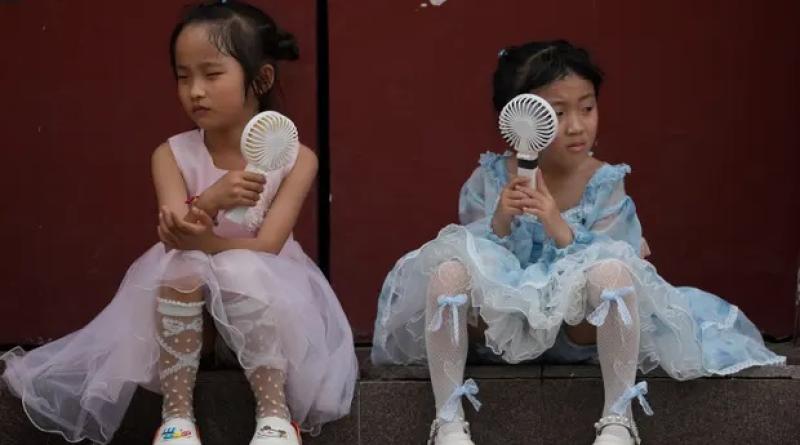As Beijing swelters, activists hope the heat will prompt climate action

As temperatures in the Chinese capital are forecast to creep back up to record-breaking heights this weekend, activists are hoping that overheated Beijingers will start thinking about the causes of, as well as the solutions to, such intense heatwaves.
Last weekend the mercury soared past 40C (104F) for three consecutive days, the first time that the city has endured such prolonged heat since its weather station started recording temperatures in 1951. Surrounding areas also issued “red” weather warnings, indicating that the temperature could surpass 40C within 24 hours.
While social media is flooded with hacks for keeping cool, such as eating cold noodles and sporting a “Beijing bikini”, some Chinese people are yet to connect the extreme heat with the climate crisis, something activists want to change. But with obstacles from the government in the form of censorship and a clampdown on civil society, spurring action is difficult.
Global warming is causing more frequent and intense heatwaves across the region. A study published in May found that climate change was responsible for heatwaves being at least 2C hotter in other parts of Asia.
“People are becoming more aware of the severity of heatwaves, but not the link between heatwaves and climate change,” says Zhao Li, a senior researcher for Greenpeace east Asia’s Beijing office.
That is partly because, although there is some limited education about climate change, permitted discourse stops short of talking about major policy shifts, such as reducing China’s coal emissions more rapidly. The government has pledged to become carbon neutral by 2060, but concerns about energy security and the need for economic growth mean that local authorities are showing no sign of backing down on building new coal power.
Also, says Zhao, “even if people link heatwaves and climate change, they don’t think it’s something that the individual should pay attention to.” Most people see it as being the government’s responsibility – and therefore out of the hands of the public, she says.
Still, awareness of climate change, and discussion about how it can be managed, is ticking up. The topic is increasingly discussed in state media. Analysis by Sixth Tone, a state-backed outlet, found that mentions of key words relating to climate change jumped from about 750,000 in 2019 to nearly 3.3m in 2021.
Surveys suggest that, compared with the US, a slightly higher proportion of Chinese people accept that climate change is happening and that it is caused by human activity.
But as in the west, activists often find that appealing to people’s personal needs is more effective in changing behaviour than abstract arguments. Feng Jing is the founder of Road to Tomorrow, a Shanghai-based group that promotes sustainability through the lens of healthy eating, such as by encouraging people to eat less meat and more local produce. “Food is easy to understand, and then you can make connections with your health and the health of the planet,” she says.
“Changing [behaviour] is always very hard. It takes a long time to convince people,” Feng says. She believes that China is still in the raising awareness phase of climate consciousness, rather than taking action.
‘People are getting used to the words “climate change”’
In 2019, Shanghai became the first city in China to introduce mandatory recycling. Several other cities, including Beijing, soon followed suit. State media claims that more than 90% of Shanghai households are compliant with the new regime. But as with most green initiatives, the directive came from above rather than a grassroots movement.
That is partly because, although there is some limited education about climate change, permitted discourse stops short of talking about major policy shifts, such as reducing China’s coal emissions more rapidly. The government has pledged to become carbon neutral by 2060, but concerns about energy security and the need for economic growth mean that local authorities are showing no sign of backing down on building new coal power.
Also, says Zhao, “even if people link heatwaves and climate change, they don’t think it’s something that the individual should pay attention to.” Most people see it as being the government’s responsibility – and therefore out of the hands of the public, she says.
Still, awareness of climate change, and discussion about how it can be managed, is ticking up. The topic is increasingly discussed in state media. Analysis by Sixth Tone, a state-backed outlet, found that mentions of key words relating to climate change jumped from about 750,000 in 2019 to nearly 3.3m in 2021.
Surveys suggest that, compared with the US, a slightly higher proportion of Chinese people accept that climate change is happening and that it is caused by human activity.
But as in the west, activists often find that appealing to people’s personal needs is more effective in changing behaviour than abstract arguments. Feng Jing is the founder of Road to Tomorrow, a Shanghai-based group that promotes sustainability through the lens of healthy eating, such as by encouraging people to eat less meat and more local produce. “Food is easy to understand, and then you can make connections with your health and the health of the planet,” she says.
“Changing [behaviour] is always very hard. It takes a long time to convince people,” Feng says. She believes that China is still in the raising awareness phase of climate consciousness, rather than taking action.
‘People are getting used to the words “climate change”’
In 2019, Shanghai became the first city in China to introduce mandatory recycling. Several other cities, including Beijing, soon followed suit. State media claims that more than 90% of Shanghai households are compliant with the new regime. But as with most green initiatives, the directive came from above rather than a grassroots movement.
cover photo:Children cool themselves with electric fans as they take a rest near the Forbidden City on a hot day in Beijing. Photograph: Andy Wong/AP






